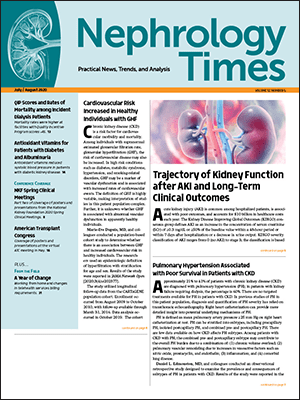
Patients with both end-stage heart failure and severely impaired kidney function are candidates for simultaneous kidney-heart transplants (SKHT). There are limited data on renal outcomes in patients undergoing SKHT, obtained primarily from single-center studies. Krishna Agarwal, MD, and colleagues conducted an analysis of data from the United Network for Organ Sharing (UNOS) dataset on 1706 recipients of SKHT.
Results of the retrospective cohort analysis were reported in a presentation during the NKF Spring Clinical Meetings. The presentation was titled Factors Associated with Renal Graft Loss in Simultaneous Kidney-Heart Transplant Recipients in the UNOS Cohort.
The analyzed data included patients who received their transplants between October 1987 and December 2018. The researchers compared the incidence and risk factors of renal allograft loss in SKHT recipients with failed renal allograft with those with a functioning renal allograft at 3-year follow-up. Continuous variables were compared using the Student t-test or the Kruskal Wallis test; categorical variables between groups were compared using the Chi-2 test. Cox regression hazard models were used to examine the factors associated with graft failure.
The analysis included 1706 SHKT recipients. Over 3 years of follow-up, 94.3% (n=1608) had functioning renal allografts and 5.7% (n=98) had failed renal allograft. Compared with the group with functioning renal allograft, those with failed renal allograft were more likely to have high-risk cytomegalovirus status, expanded-criteria donor, delayed graft function, and higher creatinine at discharge. In the group with functioning renal allograft, use of tacrolimus at discharge was higher than among patients with nonfunctioning renal allograft.
Causes of renal allograft failure were primary failure (16%), chronic rejection (12%), acute rejection (11%), cardiorenal (8%), infection (7%), and other causes in the remainder.
The researchers said, “The number of simultaneous kidney-heart transplants has been gradually increasing in the United States over the past two decades from 11 before 1990 to 208 in 2018. Single-center studies have previously described renal outcomes in SKHT recipients at their respective centers. Our study describing the factors associated with renal graft loss in SKHT recipients in the UNOS database is the largest to date.”
Source: Agarwal K, Almonte K, Patel H, Cardarelli F, Agarwal N. Factors associated with renal graft loss in simultaneous kidney-heart transplant recipients in the UNOS cohort. Abstract of a presentation at the National Kidney Foundation 2020 Spring Clinical Meetings; abstract #453.







 © 2025 Mashup Media, LLC, a Formedics Property. All Rights Reserved.
© 2025 Mashup Media, LLC, a Formedics Property. All Rights Reserved.